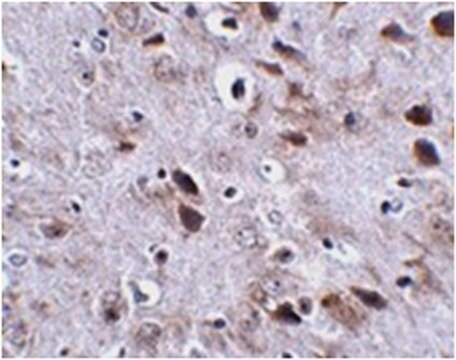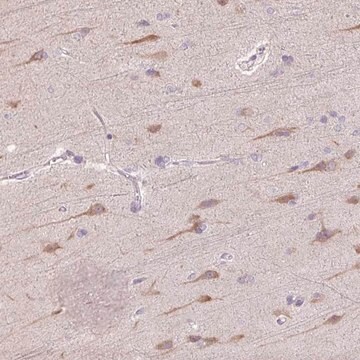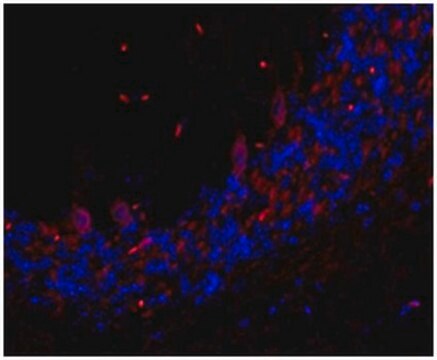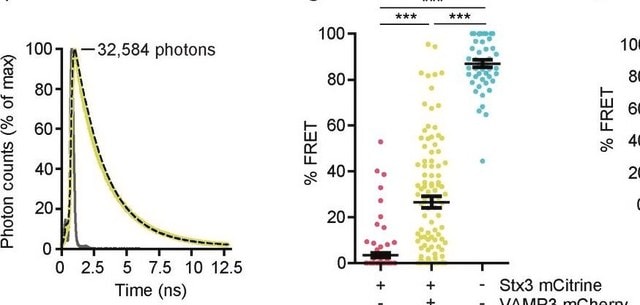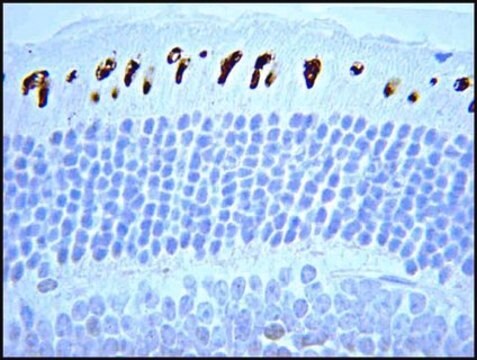ABN1721M
Anti-TMEM100
from rabbit, purified by affinity chromatography
Sinónimos:
Transmembrane protein 100
About This Item
Productos recomendados
biological source
rabbit
Quality Level
antibody form
affinity isolated antibody
antibody product type
primary antibodies
clone
polyclonal
purified by
affinity chromatography
species reactivity
mouse
packaging
antibody small pack of 25 μg
technique(s)
immunofluorescence: suitable
immunohistochemistry: suitable (paraffin)
immunoprecipitation (IP): suitable
western blot: suitable
isotype
IgG
NCBI accession no.
UniProt accession no.
target post-translational modification
unmodified
Gene Information
mouse ... Tmem100(67888)
General description
Specificity
Immunogen
Application
Immunofluorescence Analysis: A representative lot detected TMEM100 in DRGs (Weng, H.J., et. al. (2015). Neuron. 85(4):833-46).
Western Blotting Analysis: A representative lot detected TMEM100 in DRG from cervical to lumbar levels (Weng, H.J., et. al. (2015). Neuron. 85(4):833-46).
Immunoprecipitation Analysis: representative lot detected TMEM100 in whole-cell DRG or CHO cells lysates (Weng, H.J., et. al. (2015). Neuron. 85(4):833-46).
Western Blotting Analysis: A 1:5,000 dilution from a representative lot detected TMEM100 in Dorsal root ganglion (DRG) of WT & TMEM100 CKO mice (Courtesy of Drs. Hao-Jui Weng and Xinzhong Dong at Johns Hopkins University).
Immunofluorescence Analysis: A 1:200 dilution from a representative lot detected TMEM100 in Dorsal root ganglion (DRG) sections from Avil-Cre;Tmem100+/+ (Wild Type mice) and Avil-Cre;Tmem100fl/fl (Tmem100 CKO) mice (Courtesy of Drs. Hao-Jui Weng and Xinzhong Dong at Johns Hopkins University).
Quality
Western Blotting Analysis: 1 µg/mL of this antibody detected TMEM100 in 10 µg of mouse lung tissue lysate.
Target description
Other Notes
¿No encuentra el producto adecuado?
Pruebe nuestro Herramienta de selección de productos.
Storage Class
12 - Non Combustible Liquids
wgk_germany
WGK 1
flash_point_f
Not applicable
flash_point_c
Not applicable
Certificados de análisis (COA)
Busque Certificados de análisis (COA) introduciendo el número de lote del producto. Los números de lote se encuentran en la etiqueta del producto después de las palabras «Lot» o «Batch»
¿Ya tiene este producto?
Encuentre la documentación para los productos que ha comprado recientemente en la Biblioteca de documentos.
Nuestro equipo de científicos tiene experiencia en todas las áreas de investigación: Ciencias de la vida, Ciencia de los materiales, Síntesis química, Cromatografía, Analítica y muchas otras.
Póngase en contacto con el Servicio técnico